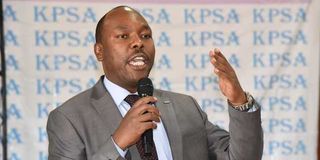Looming crisis as over 200 private institutions close down

The Kenya Private Schools Association CEO Peter Ndoro at a past event.
What you need to know:
- Most private schools are facing a financial crunch, with most struggling to stay afloat with few learners.
- Some schools turned their premises into other ventures, as others’ properties were auctioned due to unpaid rent and loans.
It will be a chaotic start to the year when schools fully reopen in January as thousands of learners in private schools will be forced to look for admission in new institutions.
The Kenya Private Schools Association (KPSA) Chief Executive Officer Peter Ndoro, yesterday told the Nation that so far, 227 private primary and secondary schools have been driven out of business, leaving 56,000 learners without schools to report back to.
Therefore, parents will need to scout about for new institutions, Mr Ndoro said. He revealed that more schools could be forced to close by January as they have signalled they are struggling to maintain learners in Grade Four, Standard 8 and Form Four.
Most private schools are facing a financial crunch, with most struggling to stay afloat with few learners.
“How they will accommodate the other learners in January is still a puzzle,” Mr Ndoro said.
KPSA has advised some of the schools that closed to alert parents in advance to spare them last-minute preparations, which may cause some learners to miss admission for the second term.
Some schools turned their premises into other ventures, as others’ properties were auctioned due to unpaid rent and loans.
The number of closed schools could be higher as not all private institutions are KPSA members, Mr Ndoro said.
In Kenya, at least 2.5 million learners attend private schools. With the ongoing financial strain, more learners may be forced to seek admission to public schools, stretching their capacity even further. Mr Ndoro said private schools have inadequate infrastructure and space to accommodate learners.
Financial grants
The institutions are now calling on the government to start issuing financial grants to enable their sustainability.
Currently, learners are sitting at a distance of 1.5 metres from each other as schools observe the health guidelines on the Covid-19. This has made many schools to limit the number of learners to a maximum of 25, with others accommodating only 15.
“It’s proving difficult when the government asks private schools to keep children in the institutions without any financial support,” the KPSA boss said.
Mr Ndoro lamented that despite the government’s promise of loans worth Sh7 billion to cushion private schools from the effects of the pandemic, the money has never been released.
He asked the government to prioritise education as a basic need, and fund all schools regardless of whether they are private or public during the pandemic.
He also noted that most learners reported to school without fees, forcing owners to limit the number of teachers who resumed work in October.
At least 1,200 teachers in these schools have also been rendered jobless.
KPSA Vice-Chairman Isaiah Mbaabu said if the situation is not remedied, more than 1,000 schools might not open in January, meaning, over 200,000 learners will have to be enrolled elsewhere.
He noted that owing to the uncertainty of the business, many other schools have decided that they will shut down in March next year after Standard Eight learners sit the national examinations .
He urged the government to make plans on where candidates in the closed schools will sit their examinations.






